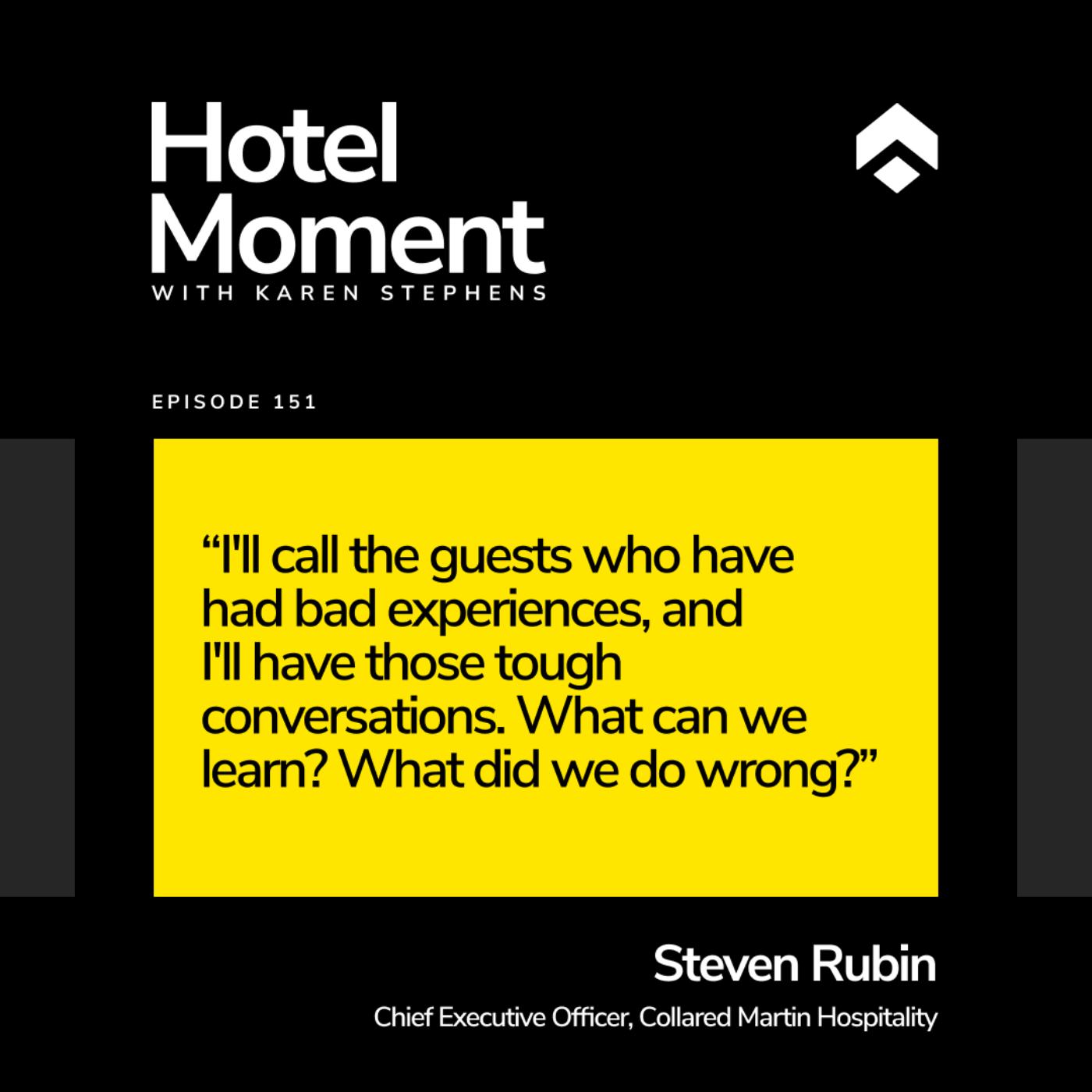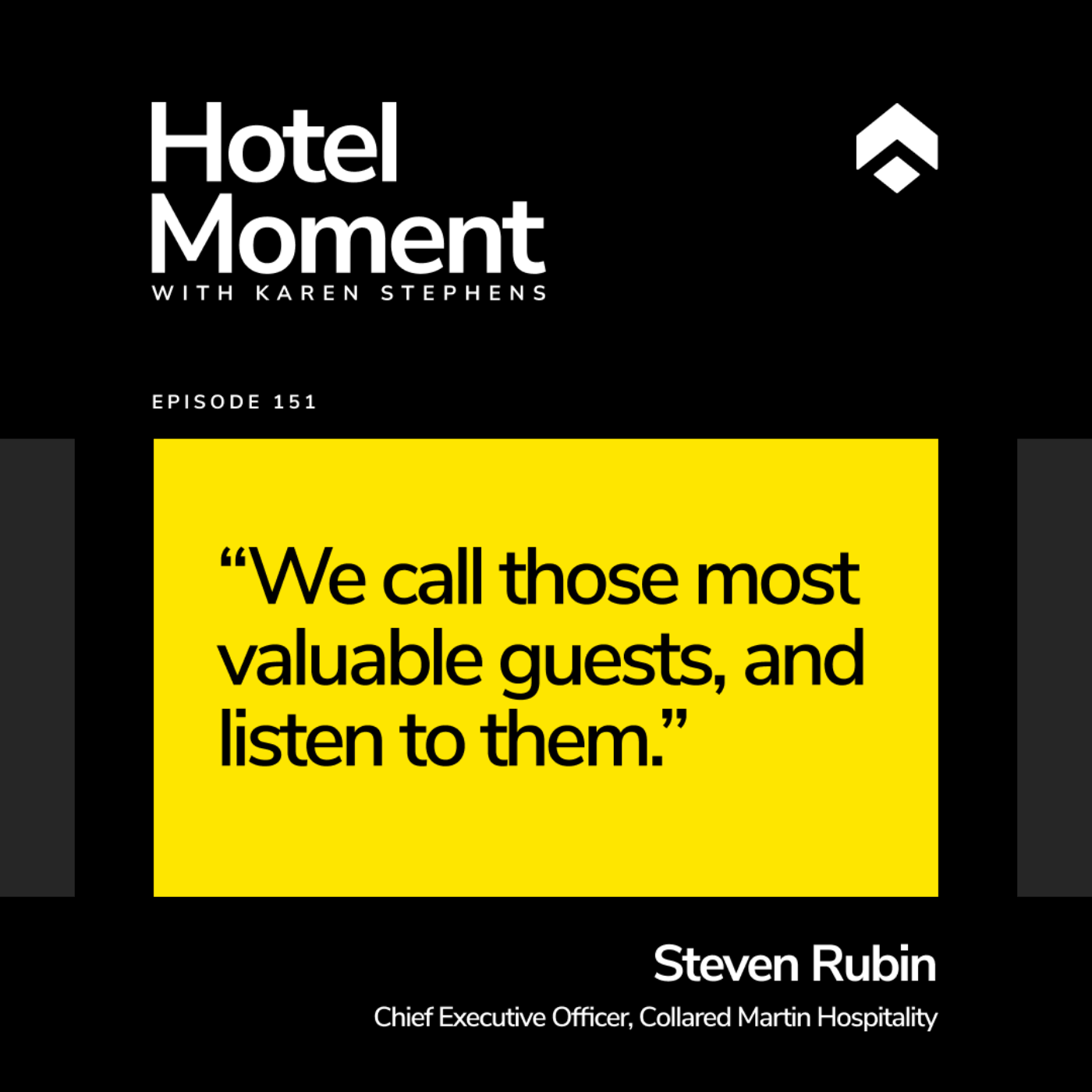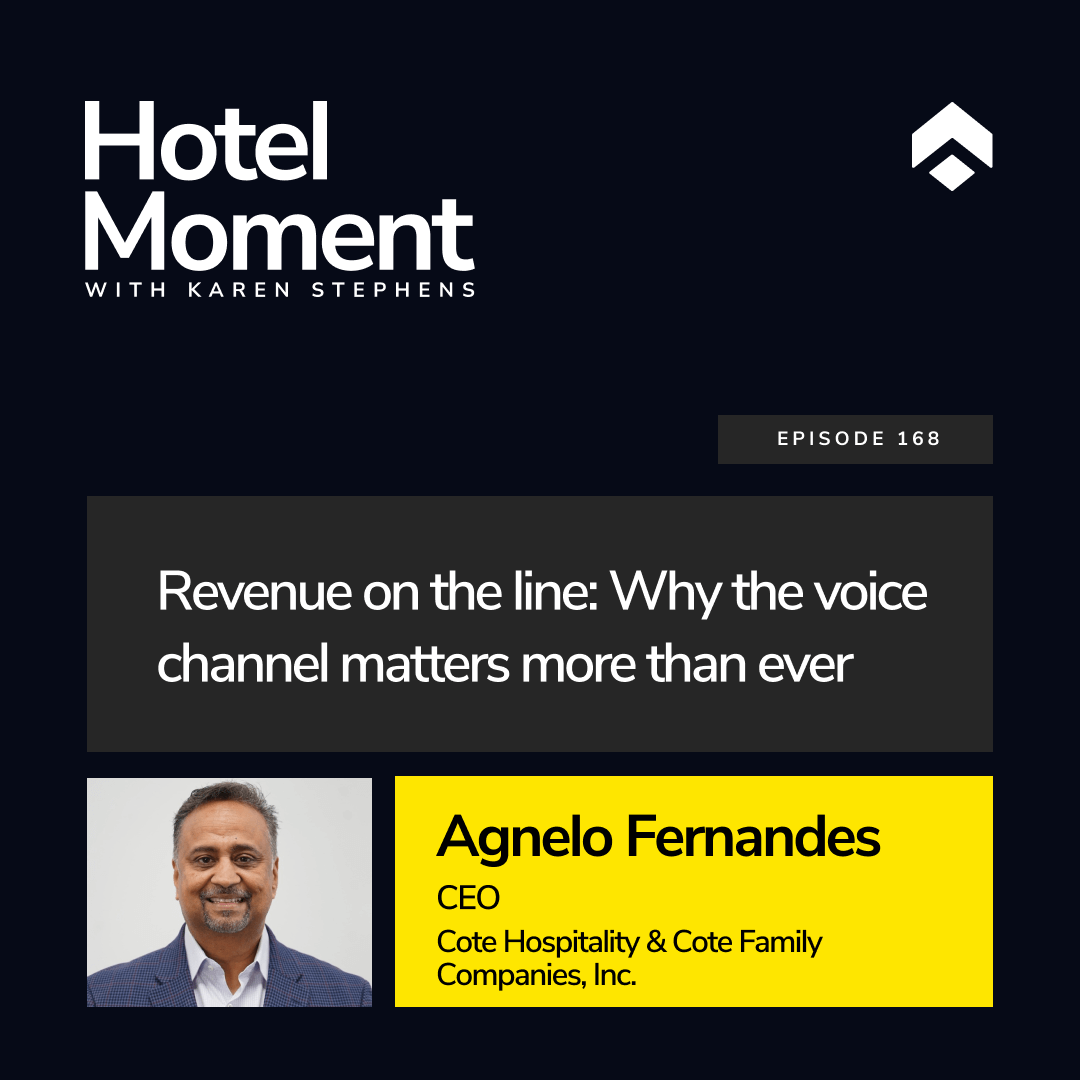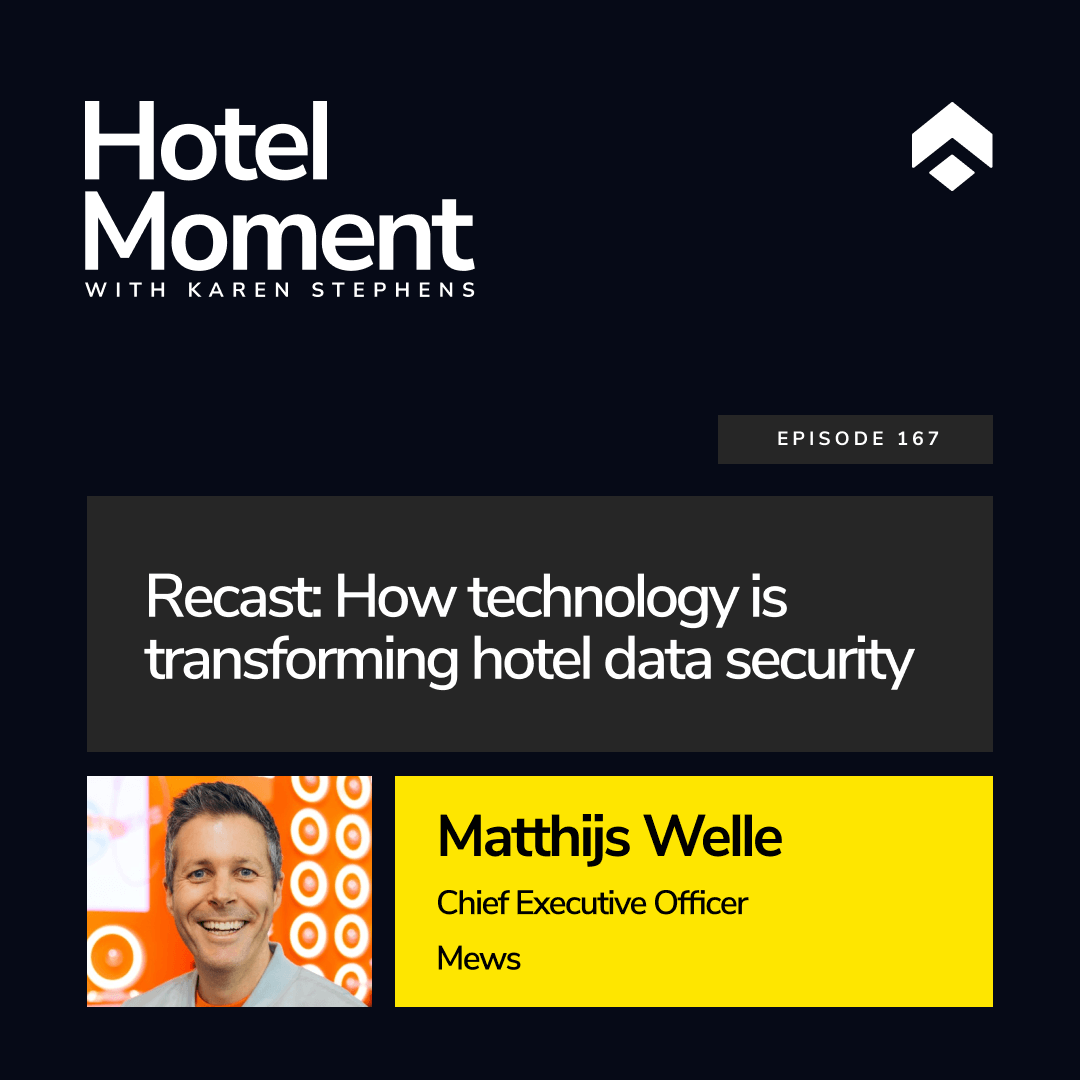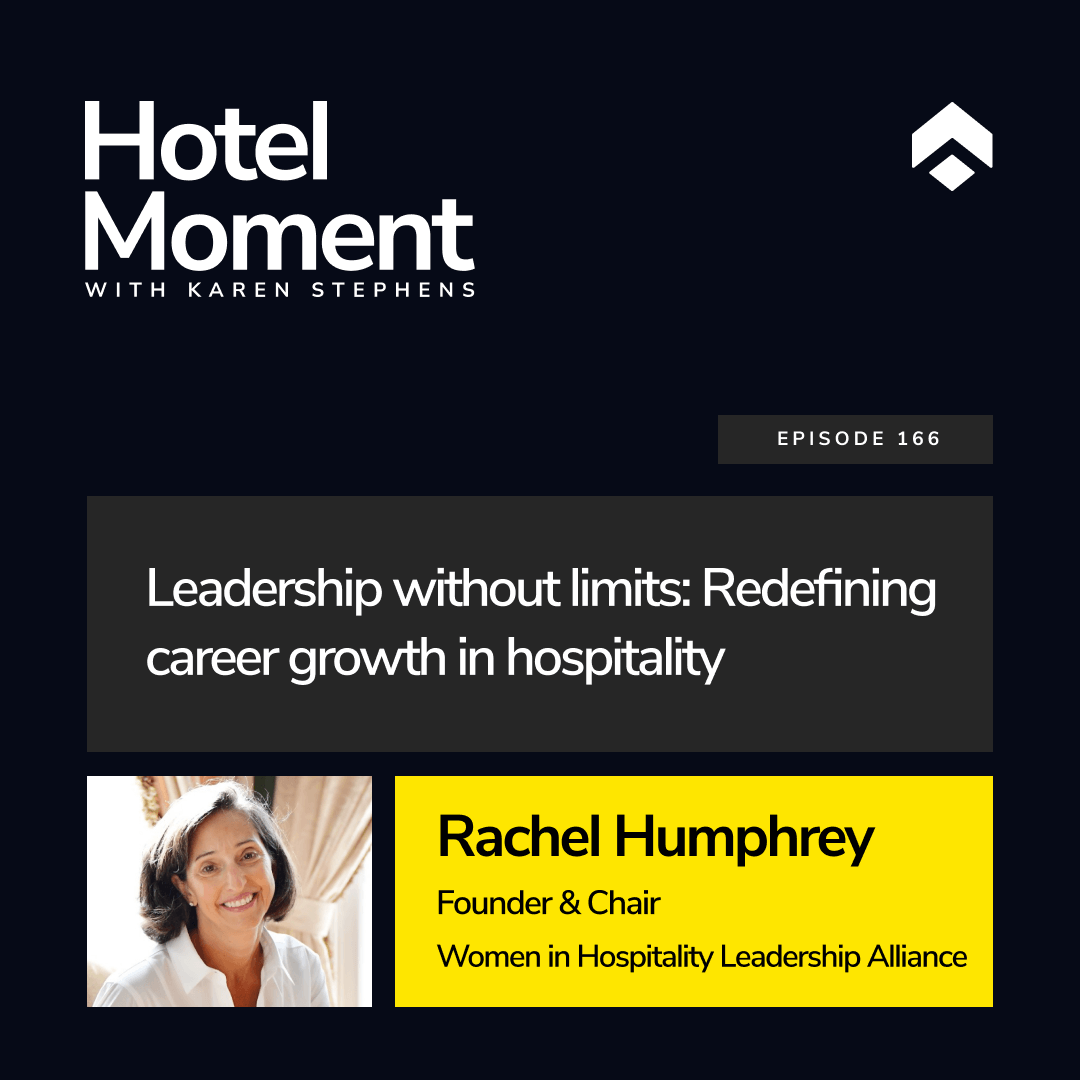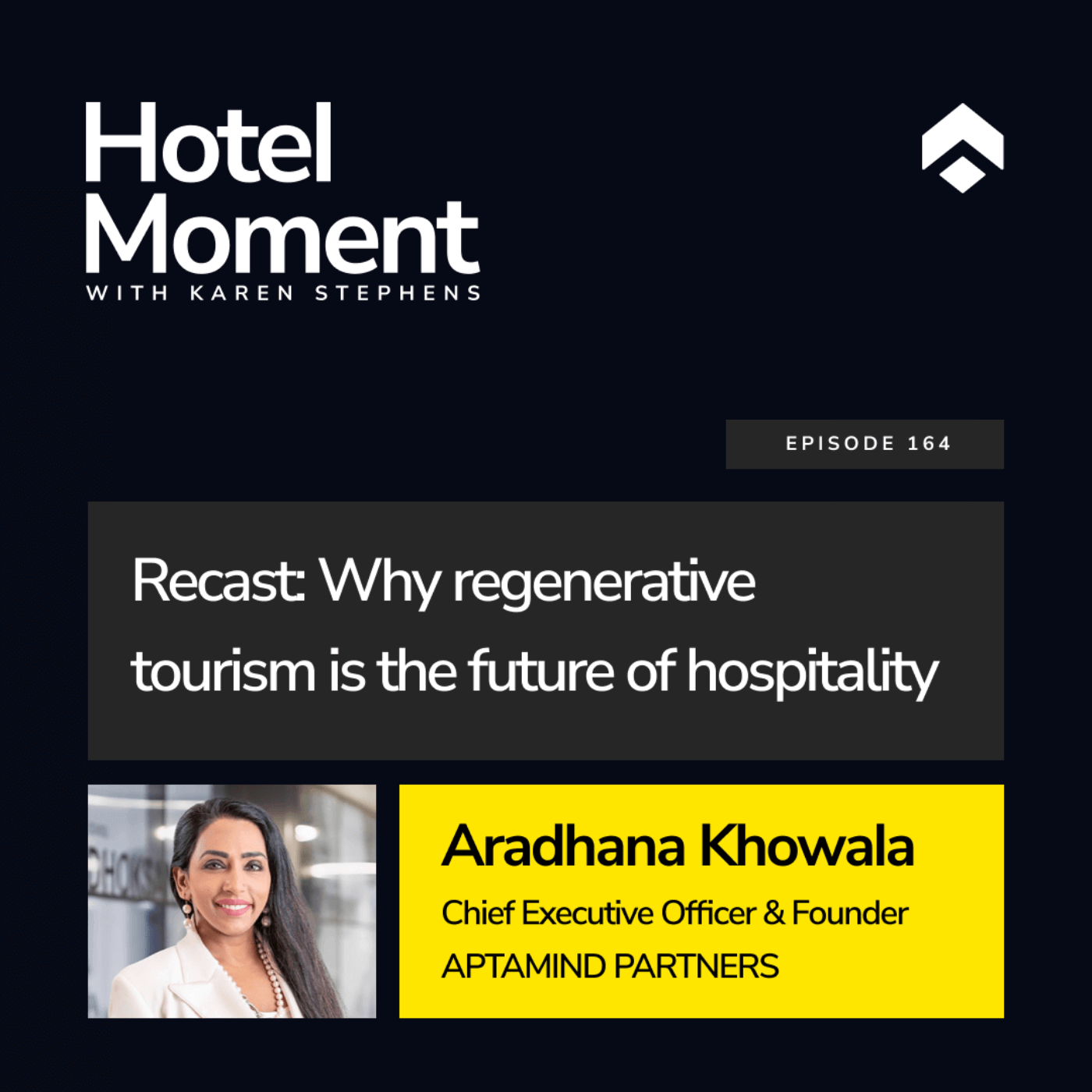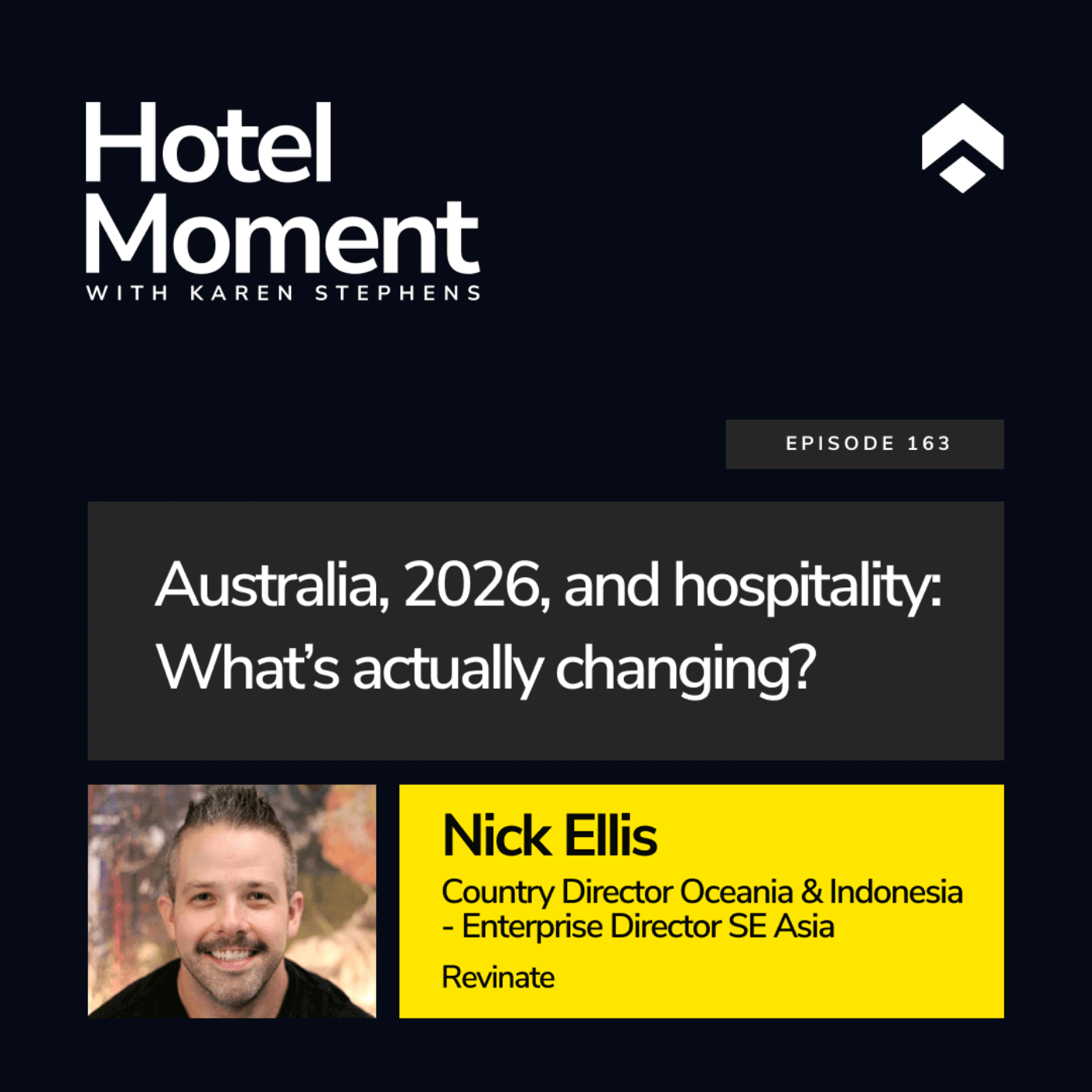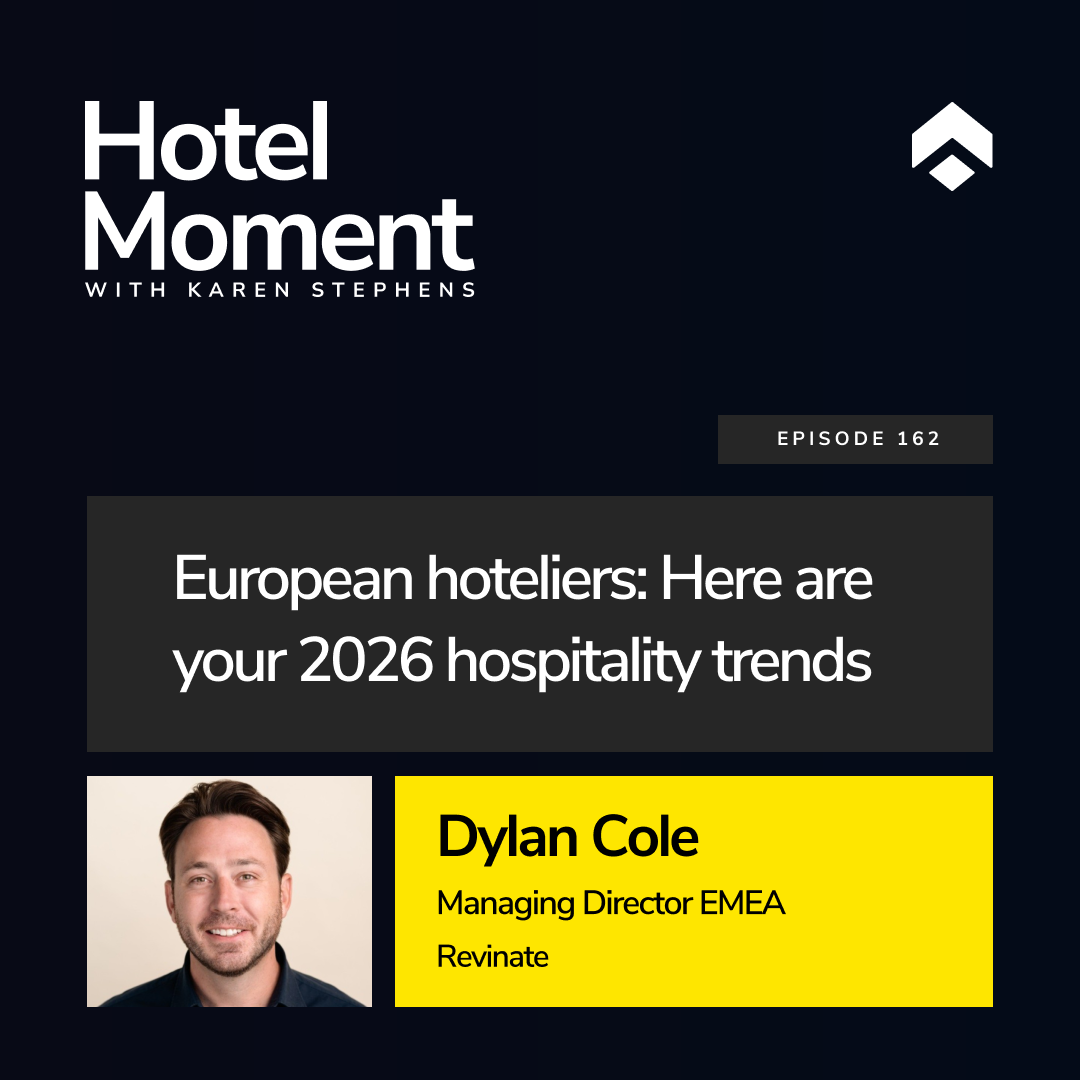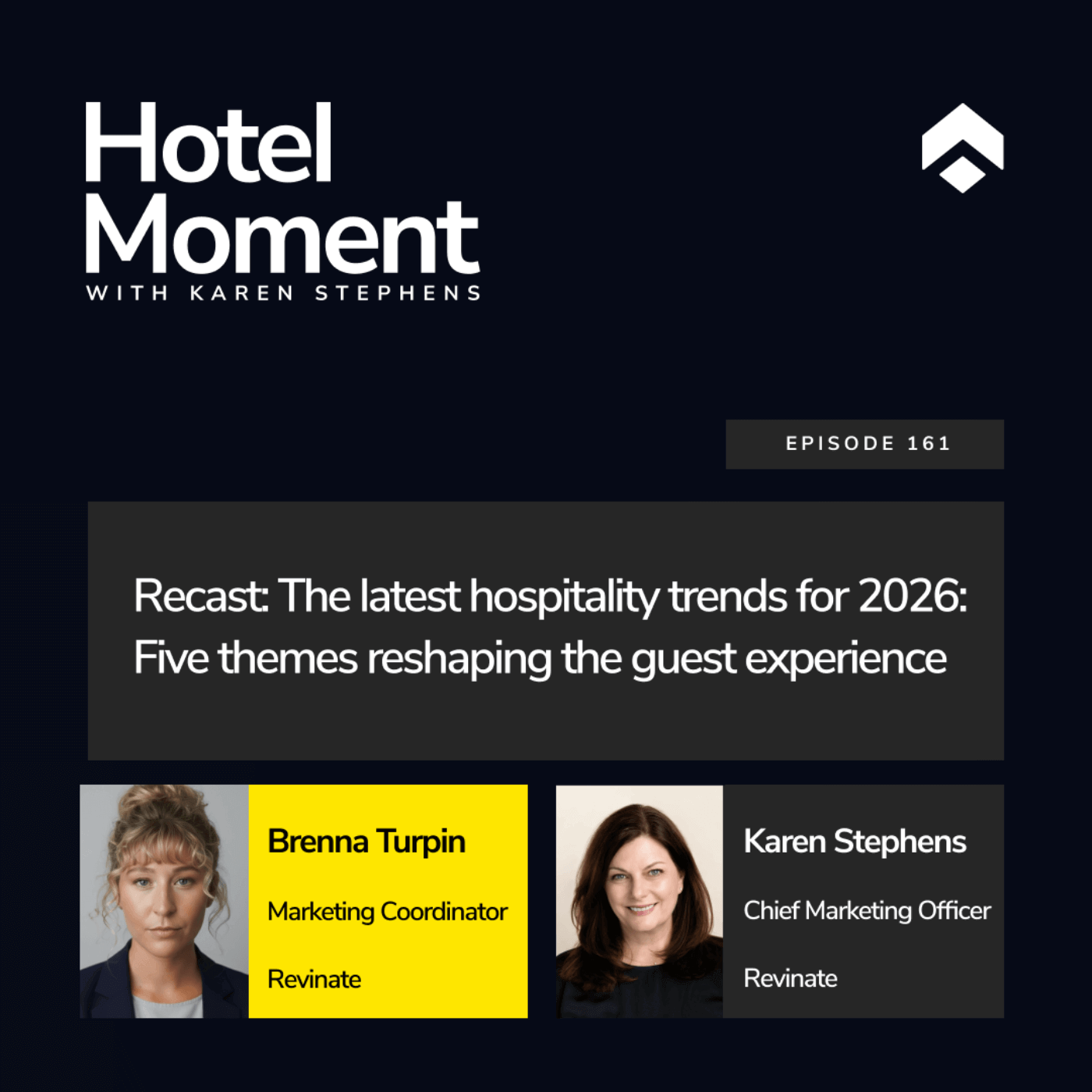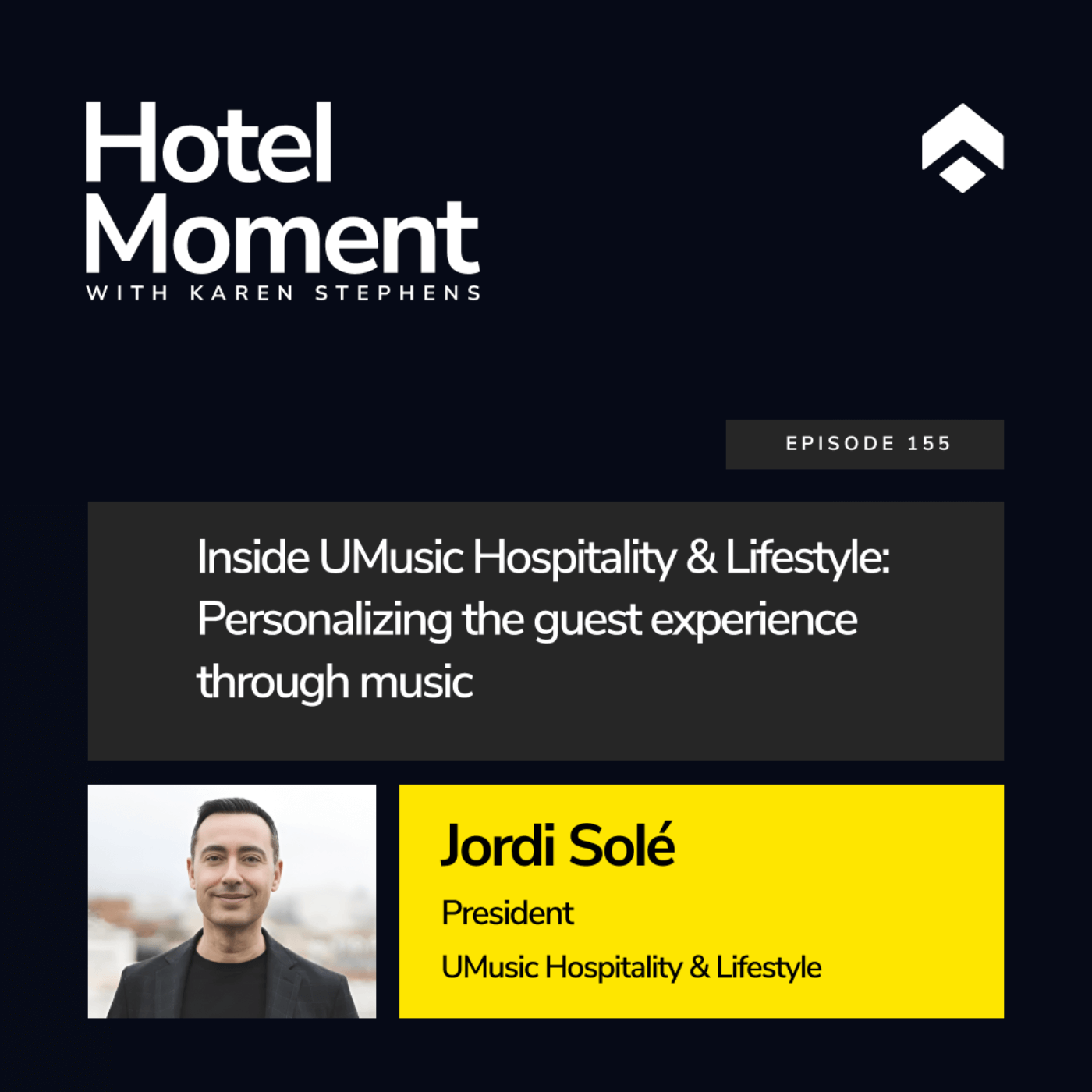Hotel Moment
WITH KAREN STEPHENS


Episode 151
Why personalized guest experiences matter to Collared Martin Hospitality
In this week’s episode of Hotel Moment, Steven Rubin, CEO of Collared Martin Hospitality, joins Revinate CMO Karen Stephens, with the answer on how to keep the soul of hospitality alive. And it’s simply one phone call at a time.
Steven harnesses the power of data and the power of the voice channel to not only reclaim dissatisfied guests but to personalize relationships. According to Steven, it’s how authentic communication like this transforms service challenges into loyal stories.
And Steven also urges hoteliers to ask the right questions and truly get to know guests. The information shared in those conversations becomes a powerful tool for future marketing and upsell opportunities that Steven believes some hoteliers fail to leverage.
Tune in to find out how a simple phone call, paired with the right strategy, can drastically improve your guest experience and put more money back in your pocket.
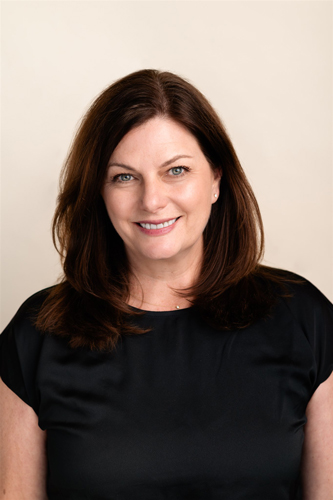
Meet your host
Karen Stephens
As Chief Marketing Officer at Revinate, Karen is focused on driving long-term growth by building Revinate’s brand equity, product marketing, and customer acquisition strategies. Her deep connections with hospitality industry leaders play a key role in crafting strategic partnerships. Karen has more than 25 years of expertise in global hospitality technology and online distribution — including managing global accounts in travel and hospitality organizations such as Travelocity and lastminute.com
As the host of The Hotel Moment podcast, she interviews top players in the hospitality industry. Karen has been with Revinate for over 11 years, leading our global GTM teams. Her most recent transition was from Chief Revenue Officer, where she led the team in their highest booking quarter to date in Q4 2023.
Watch the video
Transcript
[00:00:00] Steven Rubin: I believe in calling guests, personally reaching out to guests. I think everyone does a fantastic job of using their CRM for email communication. And, again, we’re saying we’re trying to bring back the soul of hospitality. So let’s pick up the phone.
[00:00:18] Intro: Welcome to the Hotel Moment podcast presented by Revinate, the podcast where we discuss how hotel technology shapes every moment of the hotelier’s experience. Tune in for our guest episodes where we explore the cutting edge technology transforming the hospitality industry and hear from experts and visionaries shaping the future of guest experiences. Alongside our conversations with guests, we have episodes for you hosted by Revinator, Brenna Turpin, on resources available to you all. These resource packed episodes have granular advice on overcoming industry and operational challenges so you can emerge as a hotel superhero. Whether you’re a hotelier or a tech enthusiast, you’re in the right place. Let’s dive in and discover how we can elevate hospitality together.
[00:01:05] Karen Stephens: Hello, and welcome to the Hotel Moment podcast. I am your host, Karen Stephens, the Chief Marketing Officer of Revinate. Today, we are excited to speak with Steven Rubin, the CEO of Collared Martin Hospitality, a company he founded in 2025 to redefine the guest experience across lifestyle and boutique hotels. With nearly three decades of expertise in hospitality, strategy, technology, and service excellence, Steven is passionate about leveraging data, empowering teams, and creating personalized memorable experiences for guests. He’s also an adjunct professor at NYU, sharing his knowledge on current and future hospitality technologies and serves on advisory boards shaping the future of revenue optimization and guest engagement. I’m very excited to share this conversation with you. Steven Rubin, welcome to the Hotel Moment podcast.
[00:01:56] Steven Rubin: Thank you, Karen. I’m excited to be here.
[00:01:57] Karen Stephens: I’m excited as well. I had a look at your background. So I wanna talk to you about so many things, but the very first thing I wanna talk to you about is that you teach at NYU. So in addition to being the CEO of a hotel group, you’re also a professor. Can you tell us a little bit about that just to get us started?
[00:02:14] Steven Rubin: Sure. So I’m taking a semester off with everything that’s going on as we’re launched at Collared Martin Hospitality, But it’s something I’ve always wanted to do. There’s just the passion I have for education personally, but also that giving back. I was so fortunate to have an incredible education. I went to Washington State University for hospitality school, and I had so many professors that really invested deeply into my learnings. I always imagined going back and repaying that forward. So I taught at NYU first as over the strategic pricing and revenue management, and then that kind of expanded. I did some stuff on distribution marketing. And most recently, it was actually on technology and the current and future state of technology, which was really a challenge for me because it’s such a wide breadth. As you know, like, in this industry, technology is advancing so fast, but moving so slow.
[00:03:13] Karen Stephens: That’s a great way to put it. It’s advancing so fast and it’s moving so slow. And I think with everything else hoteliers are trying to do with all of the changing marketing conditions, everything else that’s happening, it’s really difficult to know what technology to adopt when, how to operationalize it. So I would love to hear a little bit more about how you tackle that first in the classroom and then how you apply it. But let’s talk about that first.
[00:03:36] Steven Rubin: Yeah. From a classroom standpoint, we spend time creating the program so that we bring in different guest speakers. So let’s first talk about the application from just a technical standpoint, how it fits and molds into everything. Integrations is always a very colorful conversation, we’ll say, because as we know it, that’s, like, the hardest part of it, and it’s still a work in progress and has been for thirty plus years. And then we bring in somebody from that vendor to talk about their system. So whether it’s property management systems, CRMs, financial accounting systems, all of that, and present their tool so the students could actually see it in real place. So that’s how we really tackled it, and it was a fun exploration.
[00:04:21] Karen Stephens: That is so cool. And now you’ve mentioned, so let’s talk a little bit about Collared Martin Hospitality. So first of all, would love to know the origins of it. You mentioned it’s a busy time for you right now. So let’s talk a little bit about that and what led you on your journey to being the CEO today.
[00:04:37] Steven Rubin: Well, the journey part, we’ll have to hold off because that’s a long conversation, but more than happy to get into it. I took a bit of an unconventional path, especially coming up from the commercial side, getting into technology and then landing as the CEO of an operating company. So, yeah, we incorporated in January 2025. We’re incredibly fortunate. We have the partners with Blue Flag Capital, which already had a billion dollars worth of assets. So, typically, with trying to start any company, right, and especially a management company, you’re spending a lot of time on the sales side. So putting together your team and while also opening hotels, figuring out the tech stack, going back to technology, and then trying to get new contracts. I didn’t have to worry about that new contract part. So we immediately had a substantial operating portfolio with Blue Flag. We also have partners with Bain Capital, so we could focus with that. Those assets already there, we could focus on branding, we could focus on recruiting, we could focus on the tech stack, customer service, and all of that. So it’s been a little bit of a culmination of, like, everything I’ve done for the past thirty years in the industry as a professional suddenly coming full circle.
[00:05:50] Karen Stephens: Wow. What a cool blessing to me. I mean, that’s the word that comes to mind, just the way that you describe that culmination of your career coming full circle and now to really be driving everything about the brand. And so tell us a little bit about the brand. Where are the hotels? Where are you headquartered? All of that good stuff.
[00:06:08] Steven Rubin: Yeah. So the hotels have been historically in the Northeast because we’re based in Boston, Massachusetts, and there’s hotels in Nantucket, Martha’s Vineyard. I’m currently actually in our property that’s gonna be going under renovation in less than a month in Greenport, New York. We just took over yesterday the management contract for property in Sag Harbor. We have properties in Montauk. And last month, we took over two properties. We’re expanding west, and we took over two properties in Jackson Hole at the base of Teton. Sorry. The base of the mountain right in Teton Village. So those are the properties we look for sought after destinations where we talk a lot about in the company the soul, the soul of hospitality, the soul of the destination, and really celebrating our destinations because we feel like part of exploration and travel is that souvenir of the experience, and the destination is that souvenir that you take back with you. So those are the locations that we currently have. And as we expand, we look for those types of locations with partnership with Bluefly Capital.
[00:07:14] Karen Stephens: That is so cool. As you were going through those destinations, I was thinking, wow, you’ve got all the holidays covered. I mean, you know, summertime, wintertime, ski, the beach, all of it. It just sounds amazing. Really cool. So let me ask you, how are you thinking about you know, you’re taking over these properties. You’re renovating. Are you accessing the guest data? Do you have access to the guests who have been there before to kinda cross promote, or what’s been your approach to guest data collection and cross marketing?
[00:07:41] Steven Rubin: It is such a fascinating question the way you put it, Karen, as far as do we have access to the history? And, really, we don’t have much. So I get email. I get, like, when they’ve stayed. You know, like, I don’t get the things that we need to make a difference and to create that genuine connection and deliver the level of service that we want to. So it’s been building it. It’s been building it from the beginning. So we invest time into looking up our guests. We are building a whole department around VIP concierge, investor relations, and guest experience. And they’ll go through and they’ll either use AI, social media, past information to create and collect the information. So that’s one half of it. The other half of it is utilizing tools like Revinate. And I think we’re probably gonna say we have some unique ways and maybe some ways that others are not using Revinate. And we do that, and then we’ll use that information to keep building that database. So for example, I believe in calling guests that have personally reaching out to guests. I think everyone does a fantastic job of using their CRM for email communication. And, again, we’re saying we’re trying to bring back the soul of hospitality. So let’s pick up the phone. I call guests that I pull from reviews from revenue. So going back to the core of revenue. Right? Guest reviews. Right? I will pull it. You guys give us email and phone number, and I’ll call the guests that have bad experiences. And I’ll have those tough conversations. What can we learn? What did we do wrong? And how can I win your travel back? There’s an old paradox that a lot of people in the industry have forgotten, which is a service failure is recovered with sincerity and excellence and being genuine can turn a dissatisfied guest into a loyal advocate, and I think that’s critical in our industry. We have to hear. We have to grow. We have to evolve. We also use the information to find our most valuable guests through tools like Revinate, and then we’ll call those most valuable guests, and I’ll listen to them too. So we’re taking the tool from a standpoint of not just using it from marketing, but for connection and creating that connection with the individuals.
[00:09:54] Karen Stephens: I love that. You know, I think for one thing, we talk about this a lot, but the voice channel I think a lot of people thinking that, oh, we’re modern. We don’t need voice. But we still we’re gonna crave human person to person contact. You letting me know that you understand what went wrong or what went right, reaching out personally is such a wonderful and that is kind of the the core of of hospitality. Um, I’m really curious because we also have a lot of customers that use the voice channel for outbound strategies. Like, when you have a big cancellation, you wanna get some guests back in the door, or even pre arrival to call and say, hey. How can we make your stay great? So have you used voice for any of that?
[00:10:33] Steven Rubin: Voice from a standpoint of just picking up the phone and calling? Yes.
[00:10:37] Karen Stephens: Calling from well, so when our customers I mean, they’re using a piece of our technology, but I’m just wondering if you’ve ever used this in practice where, you know, let’s say you have a lot of cancellations and then you say, okay. Well, who are my number one guests? Or who’s somebody that tried to book last week and we were full calling them back? Have you ever used the phone for that?
[00:10:55] Steven Rubin: Yes. And I sigh because. So integration’s never easy, like we talked about, as a lot of us know. Yes. We had an integration challenge that resulted in a 57 room hotel being oversold by 17 rooms because the group, when it transferred over, was only two days and it’s supposed to be three days. This was in the peak time in August at our Michelin Key Hotel. You’re talking about c suites. You’re talking about a lot of different individuals that were gonna be there. So, yeah, I reached out to them by both email and voice to the recovery. So I’ve had that experience. I’ve had experiences where one, specifically, we had oversold our one suite, again, because of integration challenges where the systems, you know, is booked on one, but it didn’t report that it was booked on the other. And it was a guest that was coming to celebrate their fortieth birthday, a bunch of girlfriends coming out, and I had to call them and let them know that the suite wasn’t there. And we had initially you had somebody on the property, Ynon. And I realized at that time, like, hey. As the CEO, I need to step it up, and I need to be the point person for the hard conversations when shit goes down and soften the blow for a general manager, hotel manager to have that call. So this specific guest, we were not able to obviously accommodate them in the two bedroom suite. We talked our way through everything. I found out little pieces of information. Right? It’s all about collecting pieces of data, and they love us. We found out that they were going to a brewery. We had a connection at the brewery. We got them a reservation, front row seat. The band was there. Everything. They said they felt like rock stars. The cost to us was picking up the phone, talking to them initially, and then making another call and getting them VIP access.
[00:12:43] Karen Stephens: Amen. I mean, that’s the core of hospitality. That is exactly it.
[00:12:48] Steven Rubin: Yeah. And I listened. I asked the right question and listened to what they were looking for. What are the exciting things you’re looking for during the trip? Tell me a little about yourselves. You know, it’s like, okay. You know, she really loves Twixes. Perfect. We’ll make sure that there’s Twix bars. Like, don’t just always do the same amenity. Like, I feel like when we have so many stories with that, like, using the CRM data correctly where it’s like, okay. Yes. Do you like chocolate? So I’m gonna put in a bottle of wine and chocolate. But that’s standard. We had a very influential guest that stayed at our hotel, and one of the muses of the hotel is loosely based off of Carly Simon. Because sorry I didn’t mention this. We own the Faraway brand at Collared Martin. So one of our hotels in Martha’s Vineyard is a faraway hotel. All of our faraway hotels are based off of a fictitious muse, always a woman. And this store before Alma Hillman, who is our fictitious muse at Martha’s Vineyard, she grew up there. She was really into botanicals, music, and a lot of other things, and so we have Victrola record players in all the rooms. We found out this VIP guest loved U two, favorite song, and we got that album and had it in the room. They specifically at checkout it’s one of those guests that, you know, typically don’t go to the front desk to checkout. At the time, they specifically asked to speak to the GM. They stopped by. They talked to the GM. They let the GM know how excited they were about all these other things we did, called out the album, and said they were gonna call Bono.
[00:14:19] Karen Stephens: Oh, we got to get, like, very VIP.
[00:14:23] Steven Rubin: Wow. But, again, what did it cost to take some time to find out a little bit about the guest and don’t do the standard. Right? Like, I’m sure you’re like me, love a bottle of wine and chocolate any time of the week. But that extra little step in using your CRM data to deliver that homecoming, that sense of, you know, hey. I’m traveling, but here’s a little bit of something special. They know me.
[00:14:46] Karen Stephens: And I think this is just a perfect illustration. So we talked about technology. Obviously, AI is a big thing, having all of your data in one place so that you can surface insights easily and execute on those things. But it will never replace humans because of what you just talked about. Because having the EQ to know to understand, oh, you said something about Twix, or or I know that they’re gonna go to that brewery. So let’s just call and get them a table in the front row. And then that is the experience they will remember forever, and that is true loyalty. And then it takes humans to do that. It takes people. I know humans even sounds a little too it takes people.
[00:15:24] Steven Rubin: I know. Yeah. Everyone talks about AI so much and so do we. Don’t get me wrong, but how do we use AI to enhance our personal human connections? And that’s where we focus a lot of our conversation on.
[00:15:36] Karen Stephens: Yeah. I love that. And I know that culture’s a big thing for you. Can you talk a little bit about let’s talk about now operationalizing at a hotel level. So what’s your approach to culture, and how do you teach people how to leverage both technology and the human touch to really deliver the best experience possible?
[00:15:54] Steven Rubin: Yeah. So I came up in the industry. I came up with Kimpton at the beginning And talk about culture. I mean, I know you’ve talked to many people from Kimpton, especially being based in San Francisco.
[00:16:05] Karen Stephens: Oh, you know Kathleen Renberg. I’ve known Kathleen Renbach forever. Yeah.
[00:16:09] Steven Rubin: I mean, I reported directly to her for eight amazing years, and I’m still very close with a lot of the people from Kimpton. And I think that that culture of, you know, we’re not just here to build a business together, but we’re here to build each other and grow as individuals and humans. So that’s something that I’ve taken from the classroom. I’ve always tried to build a culture of open communication in the classroom. I also believe that from a standpoint of my role now, I love to check out of the hotel or check into the hotel and just spend time talking to the employees, the team members. Love to speak to the guests too, but I wanna spend a lot of time talking to my team members. Whether you’re a front desk agent that’s on a j one and you’re just here for the summer, I wanna hear from you. I wanna hear about your experiences. I wanna learn from you. And I think that creating that culture and letting everyone know that we’re here for each other is really important. I also think it’s important to be grounded in stories and in symbolism. So we have a strong mission, we have a strong vision, we have our pillars, and we try to make sure that there’s those connections of who we are and what we’ve built the company on that we can always relate back to and celebrate them. So whether it’s the Collared Martin symbolism or, like I said, our vision, which is dream to explore, live to inspire, how do we take those learnings and keep those as our foundation?
[00:17:33] Karen Stephens: Yeah. I love that. I love having a mission statement that employees can really gather around. I also feel that the true spirit of hospitality, again, it’s the people. If your staff is really excited and happy to be there, that’s gonna come out when they meet with the guests. And then the last thing I wanna make sure we don’t drop is you mentioned Collared Martin. So can you give us the story behind that? What is Collared Martin, and how does that translate for the brand?
[00:17:58] Steven Rubin: So Collared Martin, the name is based off of inspired by us, the swallow collard martin. So that’s where we came up with Collared Martin Hospitality. And the Collared Martin swallow was something that was is tied to sailing. And in the early days, sailors would see the Collared Martin on the return trip home, and that’s when they knew land was coming. Because the Collared Martin swallow is a migrating bird, So it became to represent homecoming and this return to family and your roots and exploration and journey, and we have a lot of that rooted in what we do. So that homecoming, that building a team, we try you know, you always talk about family with your your coworkers. And then with our guests, we wanna make sure that they have that. They have that transformative memories where they’re coming back to us. We have this saying, get lost, come back. So that’s all connected to the symbolism behind the Collared Martin Swallow. And the interesting part of it is that we haven’t even released we’re we’ve been working on our brand marks for a while now, and, hopefully, they’ll be done soon. But one of the challenges we had in creating it is the other side of, which is really cool story on the Collared Martin, is with sailors, it used to be 5,000 nautical miles, but now it’s 10,000 nautical miles. You get a tattoo of a swallow. So there’s this huge tattoo culture around the Collared Martin swallow with sailing, and we’ve been very conscious of that and cognizant of trying to make whatever our symbolism is that it also represents this beautiful tattoo. And we’ll see what we add in as far as I don’t think we’ll be branding any of our employees. But
[00:19:37] Karen Stephens: Um, how deep are you on this culture? You need a tattoo.
[00:19:42] Steven Rubin: Could be a test. Yeah. That’s right. But we wanna make sure, you know, it’s grounded in that and those connections to place and experience and each other. And so, yeah, we draw a lot from the Collared Martin Swallow.
[00:19:54] Karen Stephens: I think that’s so cool. And so many of your hotels, like you mentioned, you’re in Montauk. You’re on these coastal properties, so that’s really a nice tie in with that as well. I think it’s really cool. So looking ahead, I would love to know when your experience with technology and data so how do you see that shaping the future of boutique and lifestyle hospitality in the next, call it, five years? I know that’s a loaded question, but what do you think? Very loaded.
[00:20:18] Steven Rubin: Besides the stuff I’ve already talked about enhancing the guest stay and your ability to really deliver incredible service, the data. I remember when in building teams for with business intelligence dashboards and all of that, you’d have to have a team of data scientists. AI is changing that. I don’t need somebody that graduated with a master’s or a PhD in systems and analytics and data science in an engineer. We’re so close to being able to use AI to create your own dashboards at the hotel side and create the integrations and the connectivity, the APIs to multiple systems and do it at less money and faster than we’ve ever done in our industry. So I think that those data analytics that you’ll be able to pull and be able to create your own custom dashboards within your company that have historically been just the big brands because they have the funds to invest into the department, the skill set, and pay for the technology systems, I think that that’s really gonna change companies like mine that are smaller in the hospitality industry because you can use AI to get the data now and create the dashboards.
[00:21:28] Karen Stephens: Yeah. That’s right. Well, one thing we always say, obviously, Revinate, core of our whole biz is data. But what we believe and what is true is that you have to have everything in one place if you want AI to operate no matter what you’re trying to do. And I think that’s one of the largest issues that we have with hospitality is the siloed data. If it’s all over the place, good luck. But but I think we’re getting closer and closer, like you said.
[00:21:51] Steven Rubin: Yeah. And as you know, being in the industry as long as I have, it’s like the integration’s just.
[00:21:56] Karen Stephens: They are the worst. So for all the vendors out there, as a vendor that connects to other vendors, you have to be willing to play well in the sandbox. You have to realize that as things come online, you don’t know what’s coming six months from now that that hotelier is gonna want and need to integrate with everything else they already have. I think the days of saying, oh, hey. You can just use us in a vacuum, and we’ll solve all of your problems is I just think that those days are over. It’s too advanced, and it’s moving too quickly.
[00:22:23] Steven Rubin: No. And I’d also say, it’s just coming from revenue management and the commercial side of our industry. It was about twelve to fifteen years ago. It was that whole geeks who can speak about revenue managers. I wish that technology vendors and integrations team would be just like, you know, geeks who can just dumb it down.
[00:22:41] Karen Stephens: Right. Just tell me what you’re trying to say.
[00:22:47] Steven Rubin: I’m hospitality. I’m hotel. I get technology. I don’t get integrations in what you’re doing. Just dumb it down for me so I know what’s going on. Be truthful with me for what my risks are and how long it’s gonna take. And you know what? If you can’t do it, just tell me.
[00:23:02] Karen Stephens: Right. Let’s all save some time. Yeah.
[00:23:05] Steven Rubin: Yeah. Seriously.
[00:23:07] Karen Stephens: Yeah. That’s so true. I mean, it’s funny because I think from the vendor side of the equation, oftentimes, you’ll have hoteliers that just think that everything’s possible, and why can’t you just take this and put this over here? And as a technology company, you’re like, well, that’s actually a little more complicated. But I think you hit on something very important there. We just have to be clear about what is possible and when and clear about what is not possible because of any amount of reasons, but let’s help each other out.
[00:23:33] Steven Rubin: Yeah. And I will say that I’m really fortunate to be in the industry zone, Zev, and I actually just had this experience with Revinate where we had a challenge. It was actually just probably forty eight hours old, and we need to get a campaign out. And we didn’t have something connected the right way. I’ll be honest, my team was really frustrated. I called one person at Revinate who I’ve known for years, absolutely amazing, and it was resolved. She made one other she made a quick chat, and it was resolved within thirty minutes.
[00:23:58] Karen Stephens: Oh, who was the person? Let’s give a shout out.
[00:24:01] Steven Rubin: It was Elizabeth.
[00:24:02] Karen Stephens: Oh, Elizabeth. Good ole Elizabeth.
[00:24:04] Steven Rubin: Yes. One of the best, if not the best. And she’s always positive. Right? Like, she picks up the phone. She responds back immediately, and she was like, I got this. And a little bit was we had to come you know, the solution was not the path that everyone else was going on, but we talked it out. She’s like, yeah. I can we can solve that. Let’s do it this way. And it was boom, done.
[00:24:23] Karen Stephens: And for all of our listeners, Elizabeth is on the sales team. So she’s not a support staff. She’s not on CS, but she works obviously, has great relationships internally as well. And so I love that. She’s not like, oh, sorry. I’m gonna have to call somebody. You know? She’ll figure it out for you, which is great.
[00:24:38] Steven Rubin: So proactive. I mean, absolutely amazing.
[00:24:40] Karen Stephens: I love that. Okay. So one last question for you. What’s one piece of advice you would give an aspiring hotel leader aiming to create a meaningful guest experience or launch a brand? I mean, you mentioned Kimpton. Now it all tracks for me, like, the cool stuff you’re doing with The Muse and all that just because, wow, that was such a cool thing. And you’ve had this storied career, so I’m new to the industry. I wanna create something cool. Where do I start?
[00:25:04] Steven Rubin: I mean, I think that there’s so many spots for inspiration. So I think one is be inspired not by just what people have done in the hotel industry, but look outside the hotel industry. Be inspired by what’s going on in retail or entertainment. And then the other thing, Karen, I think I’d say is listen, truly listen, but be aggressively curious. And I think that’s the side for not just anyone who is entering into the industry or who’s coming out of school, Like, you really gotta invest fully in learning, and the only way you’re gonna do that is if you listen and be aggressively curious. Ask the questions and then just listen to the answers. If something doesn’t connect, immediately take your notes, go back, and look at it in a different way.
[00:25:49] Karen Stephens: I love that. Aggressively curious. Alright. We’ll leave it there. Hey. Thank you, Steven. I really appreciate the conversation.
[00:25:56] Steven Rubin: You’re very welcome, Karen. Thank you so much for the time.
[00:26:02] Outro: Thank you for joining us on this episode of Hotel Moment by Revinate. Our community of hoteliers is growing every week, and each guest we speak to is tackling industry challenges with the innovation and flexibility that our industry demands. If you enjoyed today’s episode, don’t forget to subscribe, rate, and leave a review. And if you’re listening on YouTube, please like the video and subscribe for more content. For more information, head to revinate.com/hotelmomentpodcast. Until next time, keep innovating.

